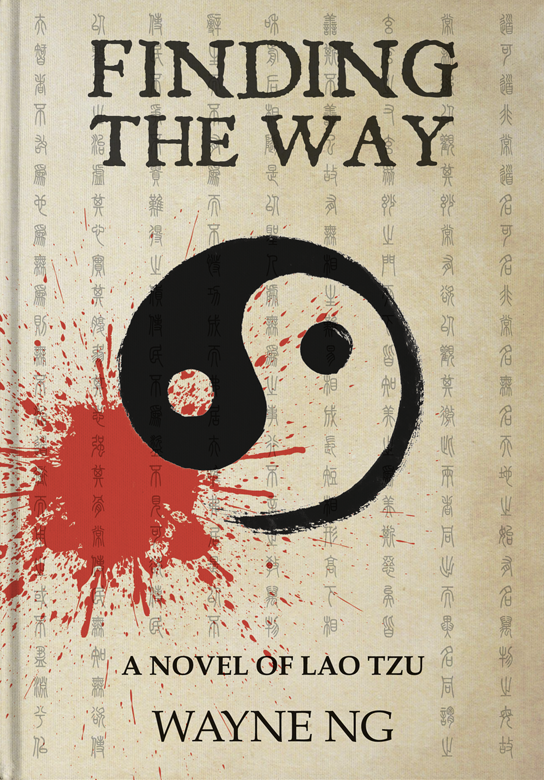by Jennifer Anne Eagleton
Wayne Ng, Finding the Way: A Novel of Lao Tzu, Earnshaw Books, 2018. 280 pgs.

Finding the Way is a bold novel. It takes courage to write a fictional life of such a revered figure as Lao Tzu (as used in the book), especially in a first novel. He is, after all, a celebrated philosopher considered to be the founder of Daoism, and who is often considered as a deity.
In telling the story of Lao Tzu’s life, we don’t have many concrete facts to work with. There are few historical records; some scholars argue that Laozi may not even have existed and that he is instead an invented amalgam of several people. However, if we take the Chinese historical records as correct, then in the sixth century BCE, he worked in the Royal Archives of the court of the Zhou dynasty in the city of Chengzhou, and while there, he and Confucius crossed paths. As Ng says at the start of the book: “It is conceivable that they met during the reign of King Jing (544–520 BCE), who supposedly had two sons, Prince Meng and Prince Chao, one of whom, according to the stories handed down, killed the other.”
The book has an interesting framing device, which draws on Sima Qian’s account in Records of the Grand Historian, written in the first century BCE. According to legend, near the end of his life, the weary, disillusioned and elderly sage headed off to the West on a water buffalo, but was detained by a border guard at the Hangu Pass. The novel begins here, with Lao Tzu narrating his life to the border guard and a scribe taking the account down. This is a slight variation on the legend that the guard had Lao Tzu write down his thoughts in what would become known as the classic Dao De Jing.
Told in the first person “I,” Ng’s novel follows Lao Tzu’s life from childhood. He is the youngest of five siblings in a rural village during a time of war and banditry as China’s ancient Zhou dynasty struggles for its survival. Lao Tzu’s father and eldest brother are forcibly conscripted into the army, and Laozi flees when his village is attacked. Decades later, when he has gained fame as a scholar, he finds himself taking charge of the archives of the Zhou royal court. We are introduced to an arrogant king, a mad queen and the twin princes Meng and Chao, who are engaged in a struggle to succeed their ill father on the throne of Zhou.
A book about a philosopher must naturally contain some philosophy. This poses some limitations on story-telling: sages deflect questions with more questions, and tend to talk in the abstract, almost in riddles—for example, the Dao De Jing starts off with “The Dao that can be told is not the eternal Dao; the name that can be named is not the eternal name,” and the concept of wu wei (non-action), are particularly challenging concepts to illustrate in action.
I quite like how the writer did this. Various incidents in the novel serve to illustrate Daoist concepts, with the competing ideologies of Daoism and Confucianism being played out by the rival princes Meng and Chao, so that the struggles at court add intrigue to the story as well as highlight the differences in philosophies. Prince Meng is open to Lao Tzu’s ideas about nature and harmony, but the bold, aggressive Prince Chao prefers Confucius’ emphasis on duty, order and stability, and of subjects being submissive to their rulers. This sets things up for a deadly battle between the siblings, and thus by extension between Daoism and Confucianism—these abstract philosophies are given a harsh test in real world politics and both are largely found wanting. Thus Lao Tzu flees to the West.
Finding the Way is quite well written, especially for a debut novel. It is a fairly easy read and would be a good beginners’ text to learn some basic ideas about Daoism, and to a lesser extent, Confucianism. The timing of events in the story is rather confusing due to the lack of chronological signposting. We jump years and decades from the time of Lao Tzu’s youth to his position as an intellectual with substantial followers. The sage-to-be is presented as wise from his early years—to me, he seems to have found the Way quite early on in the novel so it seemed as if it was an innate characteristic. He is also presented as a very human figure who could be somewhat gullible. Finding the Way therefore seems to be more about the difficulties of putting the Way into action, than actually “finding (and developing) the Way.”
The novel can also be a bit wordy at times, possibly unavoidably in a work dealing with an esoteric philosophy like Daoism, the dialogue sounding somewhat preachy and stilted. The story moves at a steady pace then accelerates, becoming a bit too dramatic for my liking with some surprising plot twists before Lao Tzu rides of into the Western sunset through Hangu Pass.
![]()

Jennifer Anne Eagleton, a Hong Kong resident since October 1997, is a committee member of the Hong Kong Democratic Foundation and a Civic Party member. She has been a close observer of Hong Kong politics since her arrival in the city. She was an adviser to the University of Hong Kong’s “Designing Democracy Hong Kong” project (2011-2013), and in 2012 completed a PhD on how Hong Kong talks about democracy using metaphor. Jennifer has written a number of language-related articles for Hong Kong Free Press and is currently compiling a book combining Hong Kong culture, photography, and political metaphor. A previous president of the Hong Kong Women in Publishing Society, Jennifer is also a part-time tutor of stylistics/discourse analysis at OUHK as well as a freelance writer, researcher, and editor on cultural topics. In her spare time she collects Hong Kong political pamphlets and artefacts.
